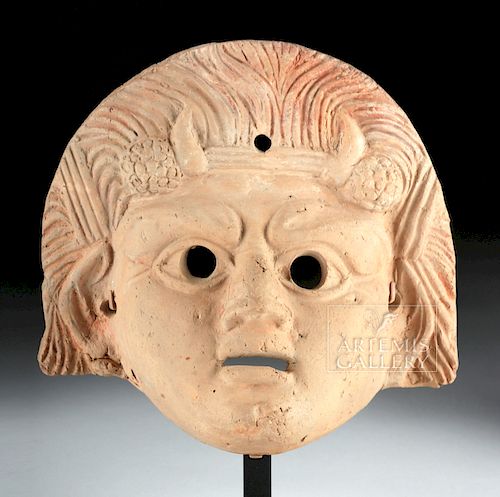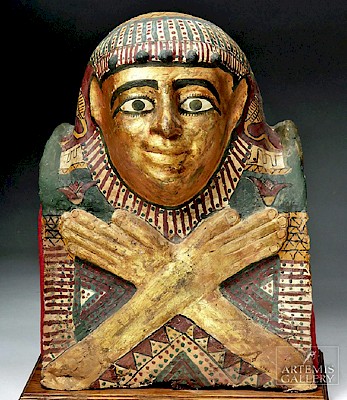Roman Terracotta Actor's Mask w/ TL
Lot 63c
About Seller
Artemis Fine Arts
686 S Taylor Ave, Ste 106
Louisville, CO 80027
United States
Selling antiquities, ancient and ethnographic art online since 1993, Artemis Gallery specializes in Classical Antiquities (Egyptian, Greek, Roman, Near Eastern), Asian, Pre-Columbian, African / Tribal / Oceanographic art. Our extensive inventory includes pottery, stone, metal, wood, glass and textil...Read more
Categories
Estimate:
$5,000 - $7,000
Absentee vs Live bid
Two ways to bid:
- Leave a max absentee bid and the platform will bid on your behalf up to your maximum bid during the live auction.
- Bid live during the auction and your bids will be submitted real-time to the auctioneer.
Bid Increments
| Price | Bid Increment |
|---|---|
| $0 | $25 |
| $300 | $50 |
| $1,000 | $100 |
| $2,000 | $250 |
| $5,000 | $500 |
| $10,000 | $1,000 |
| $20,000 | $2,500 |
| $50,000 | $5,000 |
| $100,000 | $10,000 |
| $200,000 | $20,000 |
About Auction
By Artemis Fine Arts
Jun 20, 2018
Set Reminder
2018-06-20 10:00:00
2018-06-20 10:00:00
America/New_York
Bidsquare
Bidsquare : DAY 1 | Antiquities, Asian, Russian, Fine Art
https://www.bidsquare.com/auctions/artemis-gallery/day-1-antiquities-asian-russian-fine-art-3276
Day 1 of an important 2-day auction featuring exceptional art from around the world Artemis Fine Arts info@artemisgallery.com
Day 1 of an important 2-day auction featuring exceptional art from around the world Artemis Fine Arts info@artemisgallery.com
- Lot Description
Roman, Imperial Period, ca. 1st to 3rd century CE. A spectacular mold-made terracotta tragic theater mask presenting a most expressive visage of a satyr comprised of openwork eyes and mouth, a protruding naturalistic nose, dramatic knitted brows above the eyes, and a fabulous wavy coiffure with two goat-like horns and a pair of pinecones above the forehead. Roman masks played a very critical part in ancient theatrical productions. They usually portrayed striking expressions which could be read from the all parts of the theater, even the back, enabling the audience to understand the character's emotions - the ensemble of masks reflecting a wide gamut of emotions - including anger, fear, regret, sorrow, worry, jealousy, shock, gratitude, happiness, and of course love. In addition, these masks amplified the actors' voices, making it possible for all the patrons to hear the dialogue. Size: 7.75" W x 7.375" H (19.7 cm x 18.7 cm); 9.5" H (24.1 cm) on included custom stand.
Satyrs originated in Greek mythology but were also favored by the Romans. Their goatlike features were associated with Bacchus (Greek Dionysos) and his fondness for wine and pleasures of the flesh. See another Roman satyr mask- the Lion of Chaeronea - at the Capitoline Museums of Rome.
This piece has been tested using thermoluminescence (TL) and has been found to be ancient and of the period stated. A full report will accompany purchase.
Provenance: private East Coast, USA collection
All items legal to buy/sell under U.S. Statute covering cultural patrimony Code 2600, CHAPTER 14, and are guaranteed to be as described or your money back.
A Certificate of Authenticity will accompany all winning bids.
We ship worldwide and handle all shipping in-house for your convenience.
#135489Three tiny TL drill marks on the verso. Two large sections of the coiffure/headdress reattached with a few stabilized fissures. Otherwise just normal surface wear commensurate with age.Condition
- Shipping Info
-
All shipping is handled in-house for your convenience. Your invoice from Artemis Gallery will include shipping calculation instructions. If in doubt, please inquire BEFORE bidding for estimated shipping costs for individual items.
-
- Buyer's Premium



 EUR
EUR CAD
CAD AUD
AUD GBP
GBP MXN
MXN HKD
HKD CNY
CNY MYR
MYR SEK
SEK SGD
SGD CHF
CHF THB
THB













